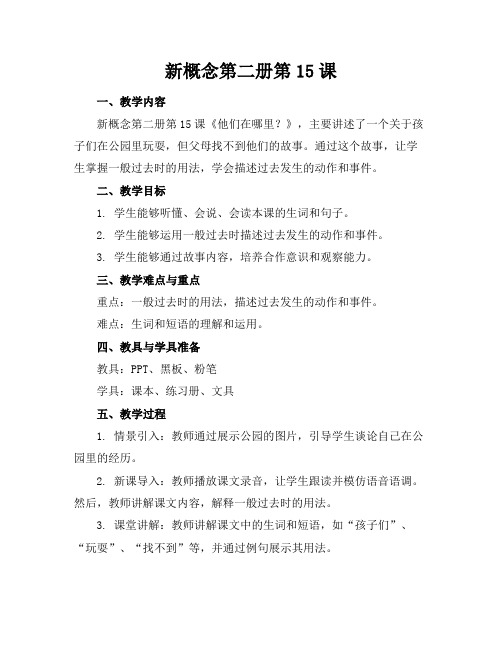新概念2 Lesson 15 NCE 2-15 new by 7c
2024新概念第二册第15课

•课文背景及作者简介•词汇及短语解析•语法结构分析•课文内容详解•阅读理解与写作技巧•练习题及答案解析课文背景及作者简介课文背景介绍01课文内容概述《新概念英语》第二册第15课主要围绕一位著名侦探展开,讲述了他如何运用智慧和技巧解决一起复杂的案件。
02课文风格与特点本文采用叙事手法,通过生动的情节和人物形象展现了侦探工作的特点和魅力,同时融入了丰富的语言知识和语法结构。
03课文在教材中的地位与作用作为《新概念英语》系列教材的重要组成部分,本文旨在提高学生的阅读理解能力、词汇量和语法应用能力,为后续学习打下坚实基础。
作者简介与文学地位作者生平简介01本文作者为英国著名作家阿瑟·柯南·道尔(Arthur Conan Doyle),他是一位享誉世界的侦探小说家和短篇小说家,以创作福尔摩斯系列侦探小说而闻名于世。
文学成就与地位02柯南·道尔的福尔摩斯系列小说被誉为世界侦探小说的经典之作,对后世产生了深远的影响。
他的作品不仅具有高度的文学价值,还为英语语言学习提供了丰富的素材。
其他代表作品03除了福尔摩斯系列小说外,柯南·道尔还创作了众多优秀的短篇小说和历史小说,如《失落的世界》、《巴斯克维尔的猎犬》等。
时代背景与文化内涵时代背景概述本文所描述的故事发生在19世纪末的英国,当时社会治安状况复杂,犯罪率居高不下,侦探行业因此应运而生并迅速发展壮大。
文化内涵与价值观本文通过展现侦探工作的艰辛与危险,传递了正义、智慧和勇气的价值观。
同时,文中还体现了作者对当时社会现实的深刻反思和对人性的深入剖析。
与中国文化的联系与比较虽然中西方文化背景和价值观存在差异,但侦探小说作为一种文学体裁在中西方都受到了广泛的欢迎。
通过比较中西方侦探小说的异同,可以深入了解不同文化背景下的审美趣味和价值取向。
词汇及短语解析重点词汇详解apologize表示向他人道歉,常用搭配为apologize to sb. for sth./doing sth.,例如:I must apologize for thedelay in replying to your letter.(我必须为没有及时回复你的信件而道歉。
新概念第二册第15课

新概念第二册第15课一、教学内容新概念第二册第15课《他们在哪里?》,主要讲述了一个关于孩子们在公园里玩耍,但父母找不到他们的故事。
通过这个故事,让学生掌握一般过去时的用法,学会描述过去发生的动作和事件。
二、教学目标1. 学生能够听懂、会说、会读本课的生词和句子。
2. 学生能够运用一般过去时描述过去发生的动作和事件。
3. 学生能够通过故事内容,培养合作意识和观察能力。
三、教学难点与重点重点:一般过去时的用法,描述过去发生的动作和事件。
难点:生词和短语的理解和运用。
四、教具与学具准备教具:PPT、黑板、粉笔学具:课本、练习册、文具五、教学过程1. 情景引入:教师通过展示公园的图片,引导学生谈论自己在公园里的经历。
2. 新课导入:教师播放课文录音,让学生跟读并模仿语音语调。
然后,教师讲解课文内容,解释一般过去时的用法。
3. 课堂讲解:教师讲解课文中的生词和短语,如“孩子们”、“玩耍”、“找不到”等,并通过例句展示其用法。
4. 实践环节:教师组织学生进行角色扮演,模拟故事中的情景,让学生运用一般过去时描述动作和事件。
5. 随堂练习:教师发放练习册,让学生完成相关的练习题,巩固所学知识。
7. 作业布置:教师布置作业,让学生运用一般过去时写一篇小作文。
六、板书设计黑板上写出一句话:“他们在哪里?”然后,教师通过板书,将句子变成一般过去时的形式:“他们在哪里?”七、作业设计1. 作业题目:请用一般过去时写一篇关于你在公园里玩耍的小作文。
2. 作业答案:(示例)昨天,我和我的朋友们一起去公园玩耍。
我们跑了很长时间,玩得非常开心。
但是,当我们想找我们的父母时,我们发现他们不见了。
我们到处找他们,但找不到。
我们决定去附近的餐馆找他们,因为他们说要给我们买冰淇淋。
当我们到达餐馆时,我们终于找到了他们。
他们都坐在那里等着我们,我们非常高兴。
八、课后反思及拓展延伸本节课通过一个有趣的故事,让学生掌握了一般过去时的用法。
新概念英语第二册 lesson 15

very bad. Het_o_l_d_(tell)me that the firm could not afford_t_o__p_a_y____(pay)such larges_a_l_a_r_i_e_s(salary / wage). Twenty people _h_a_d__l_e_f_t (leave). I knew
3. I t_o_l_d you that I _h_a_d__(have) never played tennis before.
4. What _d_id_ he _s_a_y_ that he _h_a_d_d__o_n_e_(do)?
5.When _d_id_ he _te_l_l you that he _h_a_d__b_o_u_g_h_t(buy) this car?
2. The writer _____. a. expected to receive some extra money b. was surprised to receive some extra
money c. wanted to receive some extra money d. asked for some extra money
新概念英语第二册 lesson 15(PP共T2-2精张品PP课T)件(实用版)
新概念英语第二册 lesson 15(PP共T2-2精张品PP课T)件(实用版)
The secretary told me that Mr. Harmsworth
w_o_u__ld__s_e_e_(see)me. I _fe_l_t__(feel) very nervous when I_w_e__n_t(go) into his office. He did not look up from his desk_w_h__e_n__(when/while) I entered.
新概念英语第二册Lesson15

secretary 秘书 nervous 紧张的 afford 负担得起 weak 弱的 interrupt 打断
Review the text
▪ The secretary told me that Mr. Harmsworth would see me. I felt very nervous when. I went into his office. He did not look up from his desk when I entered. After I had sat down, he said that business was very bad. He told me that the firm could not afford to pay such large salaries. Twenty people had already left. I knew that my turn had come. 'Mr. Harmsworth,' I said in a weak voice. 'Don't interrupt,' he said. Then he smiled and told me I would receive an extra thousand pounds a year!
▪ 10.Then he smiled and told me (that)I would receive an extra thousand pounds a year! 间接引语 然后他微笑了一下告诉我说,我每年将得
到1,000英镑的额外收入。
▪ =He said, ‘You will receive an extra thousand pounds a year.’ 直接引语
新概念英语第二册第15课

新概念英语第⼆册第15课Lesson 15 Good NewsThe secretaryalready left. I knew that my turn had come.'Mr. Harmsworth,' I said in a weak voice.'Don't interrupt,' he said.New words and expressions ⽣词和短语1.secretary ['sekr?t?ri] n. 秘书(secret['si:krit])私⼈秘书?2.nervous [?n?rv?s] adj. 精神紧张的;3.afford [??f?rd] v. 负担得起;4.weak [wik] adj. 弱的;5.interrupt [??nt??r?pt] v. 插话,打断参考译⽂:秘书告诉我说哈姆斯沃斯先⽣要见我。
我⾛进他的办公室,感到⾮常紧张。
我进去的时候,他连头也没抬。
待我坐下后,他说⽣意⾮常不景⽓。
他还告诉我,公司⽀付不起这么庞⼤的⼯资开⽀,有20个⼈已经离去。
我知道这次该轮到我了。
“哈姆斯沃斯先⽣,”我⽆⼒地说。
“不要打断我的话,”他说。
然后他微笑了⼀下告诉我说,我每年将得到1,000 英镑的额外收⼊。
1.The secretary told me that Mr. Harmsworth would see me.2.I felt very nervous when I went into his office.3.He did not look up from his desk when I entered.4.After I had sat down, he said that business was very bad.5.He told me that the firm could not afford to pay such large salaries.6.Twenty people had already left.7.I knew that my turn had come.8.'Mr. Harmsworth,' I said in a weak voice.9.'Don't interrupt,' he said.10.T hen he smiled and told me I would receive an extra thousand pounds a year!参考译⽂1.秘书告诉我说哈姆斯沃斯先⽣要见我。
新概念英语2第15课 NCE2_Lesson15

• 8.(b)前一句中的短语 on the way是“在路上”的意思,只有(b) during the writer' s Journey(在作者旅途中)同这个短语意思最接近,而另外3个选择(a) before the writer'sjourney, (c)after,, journey和(d) a long time ago都与 它的意思不符。
• 11.(b)需要找出前一句中 replied(回答)的同义词。(a) responded(回答,答复) 作及物动词时后面要用that引导的宾语从句,如要表示对人或某种建议作出答 复,则要用to;(c) returned(同答,返回)词义不同于 replied;(d) remarked(评论, 议论,注意到)词义不符;只有(b) answered(回答)与 replied意思相同,面且这 两个词经常可以互相替换。
• 12.(b)只有选(b) almost这个句子的意思才通顺,而其他3个句子都讲不通,也 不符合语法。
句子结构答案
I do not know any French at all.
【New words and expressions】
secretary
Mr. Harmsworth
nervous
look up afford
e.g.:She is a nervous woman. e.g.: Do you see that nervous smile on her face? e.g.: He had never spoken in public, so he was very
nervous.
新概念英语第二册15课NCE2-15

d) 现在完成时改为过去完成时: “I have just heard the news,” he said. = he said that he had just heard the news. e) 一般过去时改为过去完成时: “I broke the window,” Tom said. = Tom said that he had broken the window.
Sam says that he wants to see Mr Green.
试一试
1、我知道你是对的。
I know/knew that you are/were right.
• so,such区别: • He is so kind (a man)that everyone likes him. • He walked so fast that I couldn't catch up with him. so+adj./adv.+(可数名词单数) • He is such a kind man that everyone likes him. such +a/an+(adj.)+可数名词单数 • They are such kind people that everyone likes them. such +(adj.)+可数名词复数 • I've never eaten such delicious food.
• 1)such+a/an+形容词+可数名词单数=so+形容词+a/an+ 可数名词单数; 2)so+many/few+可数名词复数,但:such+其他形容词( many/few除外)+可数名词复数; 3)so+much/little+不可数名词,但:such+其他形容词( much/little除外)+不可数名词
新概念英语第二册学生用书Lesson15

ebook:2\nce02s15.htm
2013-1-17
Lesson 15 Good news 佳音
Page 3 of 8
Study these sentences carefully. 仔细阅读以下句子。 ‘I am busy, ’he said. “我忙,”他说道。 He says that he is busy. 他说他忙。 He said that he was busy. 他说过他忙。 He told me that he was busy. 他告诉过我他忙。 ‘I never work on Sundays, ’she said. “我星期日从不工作,”她说。 She says that she never works on Sundays. 她说她星期日从不工作。 She said that she never worked on Sundays. 她说过她星期日从不工作。 She told Mr. Harmsworth that she never worked on Sundays. 她告诉过哈姆斯沃斯先 生,她星期日从不工作。 ‘I have just finished work, ’Mr. Jones said. “我刚刚完成工作,”琼斯先生说。 Mr. Jones says that he has just finished work. 琼斯先生说他刚刚完成工作。 Mr. Jones said that he had just finished work. 琼斯先生说过他刚刚完成工作。 Mr. Jones told his wife that he had just finished work. 琼斯先生告诉过他的夫人,他刚 刚完成工作。 ‘I broke that plate, ’ he said. “我把那个盘子打破了,”他说道。 He says that he broke that plate. 他说他打碎了那个盘子。 He said that he had broken that plate. 他说过他打碎了那个盘子。 He told me that he had broken that plate. 他告诉我他打碎了那个盘子。 Mr. Jones will see you now, ’she said. “琼斯先生现在要见你,”她说。 She says that Mr. Jones will see you now. 她说琼斯先生现在要见你。 She said that Mr. Jones would see you now. 她说过琼斯先生现在要见你。 She told me that Mr. Jones would see you now. 她告诉我琼斯先生现在要见你。 ‘You can go now, ’ the teacher said. “你现在可以走了,”老师说。 The teacher says that you can go now. 老师说你现在可以走了。 The teacher said that you could go now. 老师说过你现在可以走了。
- 1、下载文档前请自行甄别文档内容的完整性,平台不提供额外的编辑、内容补充、找答案等附加服务。
- 2、"仅部分预览"的文档,不可在线预览部分如存在完整性等问题,可反馈申请退款(可完整预览的文档不适用该条件!)。
- 3、如文档侵犯您的权益,请联系客服反馈,我们会尽快为您处理(人工客服工作时间:9:00-18:30)。
He told me that the firm could not afford to pay such large salaries. Twenty people had already left. I knew that my turn had come. Mr.Harmsworth, I said in a weak voice Don’t interrupt, he said. Then he smiled and told me I would receive an extra thousand pounds a year!
He told me that the firm could not afford to pay such large salaries.
pay salaries collect salary
如此:so & such so的后面加形容词或副词 such的后面加名词, 允许在该名词前加修饰词
I knew that my turn had come.
area sign reminder fail obey
Expressions
• • • • • • park yourself take notes remind sb. of sth/doing sth. fail sth. /to do sth./ doing sth. fail sb. not/never fail to do sth.
another 一定放在数词前面 e.g: another 2 yuan 记住几个短语: one extra thousand; two others; once more; another three days
Grammar Focus
Grammer -1 间接引语的概念
• 课文摘录: “The secretary told me that Mr. Hamsworth would see me.”
He asked me, “Do you like He asked me if/whether I liked playing basketball?” playing basketball.
他问我:“你喜欢打篮球吗? ”
Thursday, July 31, 2014
7C’s NEC Loading ∙ Class ∙∙
7C’s NCE Class
Revision
• Words & Expressions • Sentence Structure.
Words park traffic ticket note
近义词:disturb vt. 打扰,扰乱
disturb sb 打扰某人 当我在工作的时候,我的表弟总是发出噪音打扰我。 My cousin always makes a lot of noise and disturbs me when I’m working.
We did not disturb him until he had finished work.
My turn has come.(书面语) It‘s my turn.(口语)
I said in a weak voice.
in a ... voice 用……的声音
in a loud(大声)/low(低声)/ weak(强调心理不踏实)/ strong (理直气壮)voice
Then he smiled and told me I would receive an extra thousand pounds a year!
secretary
Fast Reading
The secretary told me that Mr. Harmsworth would see me. I felt very nervous when I went into his office. He did not look up from his desk when I entered. After I had sat down, he said that business was very bad.
以下几个词都可以表示“再”或“又”的意 思,注意用法: extra, other, more, another more 可以放数词和名词之间, 甚至可以放在整个名词的后面 e.g: 2 more minutes / 2 minutes more extra和other 一定放在数词和名词之间,
e.g: an extra thousand pounds
• interrupt sb
• • • •
打断某人的话 1.打断(讲话或讲话人) 我不想打断你,请把你的故事讲下去。 I don‘t want to interrupt you. Go on with your story.
• 2.中断;遮断;阻碍 • You interrupted my thoughts • 你打断了我的思路。
If you are late,what will happen ?
If I am late, my boss will be angry with me.
If your boss is angry with you, what will happen ?
If my boss is angry with me, I will be fired.
Text analysis
The secretary told me that Mr. Harmsworth would see me.
Would在这里不单单指过去将来时, 更表示"想……,要……" T: 你想加入我们吗?
Would you like to join us?
I felt very nervous when I went into his office.
Guess the word stop or make a break worrying, uneasy to be able to buy or pay for
interrupt nervous afford
useless,not strong
weak
a person whose work is supporting management
let sb. go let it be obey the order meet the traffic jam welcome to XXX
Key structure
• If~~~
If you are happy, what will you do?
If I am happy, I will smile.
If you are sad, what will you do?
If I am sad, I will cry.
If you get up at 9:00 on Monday morning,what will happen ?
If I get up at 9:00, I will be late.
简说:“我很高兴能够帮助 你。”
间接引语(变化后)
that引导的宾语从句 Jane said that she was very happy to help you.
简说,她很高兴能帮助你。
Grammer - 2 直接引语转换间接引语 -不同句式的转换规则 2.2 疑问句
直接引语 (变化前) 一般疑问句 间接引语(变化后) w ['nɜːvəs]
常用表达
get nervous
变得紧张
be nervous about Don't be nervous!
对...感到紧张
不要紧张
What's she so nervous about?
afford[ə'fɔːd]
负担得起
1. 常接在 can, could 或 be able to 后表示 “买得起,花得起(费用等)” afford sth e.g: We can afford a car. afford to do sth 我们买得起一辆小汽车。 我们有钱出国旅行吗? Can we afford to go abroad ? 2. 抽得出(或匀得出)时间,花费得起(时间): e.g: We can't afford the loss of a day. 我们浪费不起一天时间。 我抽不出时间。 I can't afford the time.
Listening
What was the good news?
Listen again
New words
secretary
['sekrətərɪ]
n. 秘书;书记
美国国务卿希拉里
Secretary of State
the Secretary General 联合国秘书长
nervous
If I have enough money,
I will go for a vacation.
If I don’t have to work,
I will watch the WC.
If they don’t hurry,
they will be late for school.
If she eats too much,
she will be very fat.
Lesson 15
Good news.
New Words
New Words
• • • • • secretary n. 秘书 nervous adj. 精神紧张的 afford v . 负担得起 weak adj. 弱的 interrupt v . 插话,打断
• 直接引语和间接引语的概念 引述别人的话语一般采用两种方式: 一是原封不动地引用原话,把它放在括号内,叫 作直接引语; 二是用自己的话加以转述, 这叫间接引语.
